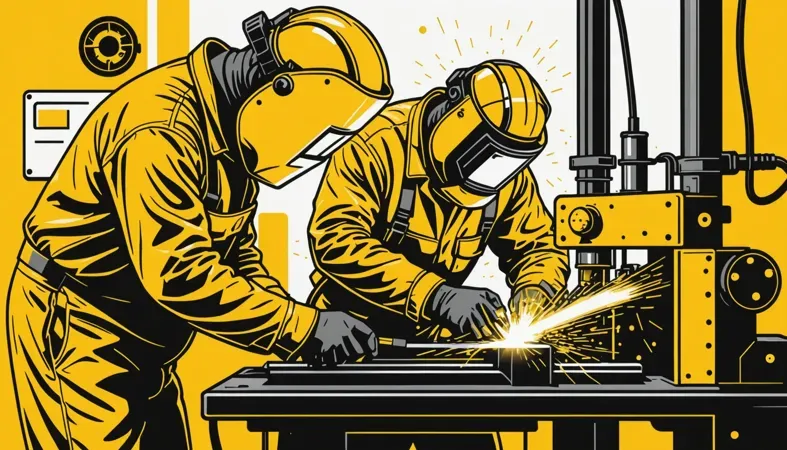How Much Does a Welder Make an Hour? Discover Hourly Wages, Factors, and Types
Published on: November 25, 2024 | Last modified: March 4, 2025
By: Joe Carter
An hourly wage is the amount of money you earn for each hour you work. It’s a simple way to calculate your income in many jobs, including welding.
Now, let’s tackle the question, how much does a welder make an hour? Knowing a welder’s hourly pay is crucial because it impacts job choice and financial planning. From my experience, understanding these wages helps you build a sustainable career and negotiate better.
In this article, I’ll cover various aspects of how much a welder makes per hour, including types of hourly wage, essential prerequisites, steps to determine earnings, safety tips, influencing factors, answering common problems, aftercare, and the benefits of knowing wage rates. You’ll get a comprehensive look into how much do a welder make an hour and more!
Contents
- How Much Does A Welder Make an Hour?
- What is Hourly Wage?
- Types Of Hourly Wage in Relation to How Much Welders Make Per Hour
- Prerequisites to Keep in Mind
- Steps to Determine How Much a Welder Makes an Hour
- Safety Tips
- Factors Affecting a Welder’s Hourly Income
- How Do Location and Industry Impact Welder Wages?
- How to Address Common Problems
- Benefits Of Knowing Hourly Wage Rates
- Applications Across Different Fields
- Exploring Alternatives to How Much Does a Welder Make an Hour
- Frequently Asked Questions (FAQs)
- Conclusion
- References
How Much Does A Welder Make an Hour?
The hourly wage refers to how much a worker earns each hour. How much does a welder make an hour? On average, welders earn about $20-$30 (USD) an hour, varying by skill level and job type. It’s challenging work, often found in construction, manufacturing, and repair.
What is Hourly Wage?
Hourly wage refers to the pay a worker receives for each hour of labor. It’s a common compensation structure in many jobs. The wage can vary by industry and is typically expressed in dollars per hour (Usd/h). According to the U.
S. Bureau of Labor Statistics, the national average hourly wage across all occupations was about $27.07 (Usd/h) in 2021.
You might wonder how much welders make per hour. I’ve seen wages range from $18 to over $30 (Usd/h), depending on skills and experience. Special certifications can significantly increase that amount.
I used this information for budgeting my expenses. Knowing a welder’s hourly wage helps determine which projects to take on. In my area, many certified welders charge around $25 to $35 (Usd/h). This insight informed my financial decisions, allowing me to invest in the right tools and skills.
Types Of Hourly Wage in Relation to How Much Welders Make Per Hour
What are the types of hourly wages?
-
Base Hourly Wage
The base hourly wage is the standard pay for welders. Typically, a welder earns about $18 to $25 (USD) per hour. Check local job listings and industry standards to find your base pay.
-
Overtime Hourly Wage
The overtime hourly wage applies when you work over 40 hours a week. This rate is usually 1.5 times the base. Multiply your base pay by 1.5 for hours over 40; that’s about $27 to $37.50 (USD) an hour.
-
Specialty Hourly Wage
The specialty hourly wage is for welders with specific skills, like underwater or certified welding. These welders can earn around $25 to $50 (USD) per hour. Certification and advanced training are often required for these jobs. It’s critical for welders to be aware of safety risks, including causes of electric shock.
-
Regional Hourly Wage
The regional hourly wage varies by location. For example, a welder in Texas might earn $15 to $30 (USD) an hour. Research wage data specific to your state or city to see how location affects pay. While considering these factors, it’s crucial to know the best practices for treating injuries such as welding burns on skin.
-
Experience-based Hourly Wage
The experience-based hourly wage increases with years in the field. Experienced welders can earn $25 to $40 (USD) an hour. To increase your pay, continue learning and gain certifications over time. Mastery in various techniques, such as welding in different positions, enhances a welder’s versatility and value. Understanding the methods for vertical welding is crucial for advancing in this career.
We’ve wrapped up the various types of hourly wages for welders. Let us turn our attention to essential prerequisites to consider.

Prerequisites to Keep in Mind
What do you need to know before diving into how much a welder makes an hour?
- Welding Certification: You’ll need credentials like AWS Certified Welder. This shows employers you have the skills they want.
- Quality Welder’s Helmet: Get something like the Lincoln Electric Viking 3350. It’s crucial for safety and comfort during long jobs.
- Appropriate Welding Machine: Use a reliable MIG welder, such as the Miller Matic 202, to ensure high-quality welds—important for justifying that hourly wage!
- Specialized Tools: A dependable set of tools, like the Hobart Handler 210 MVP, can affect your efficiency and earnings.
- Local Wage Research: Research average pay in your area, like $20-$30 per hour, since salaries can vary significantly by region.
That covers essential prerequisites to consider. Let’s now take a look at the steps to determine average hourly wages for welders.
Steps to Determine How Much a Welder Makes an Hour
Now, we’ll cover steps to find out how much a welder earns hourly in various settings.
-
Identify Location-based Salaries
Start by researching the average wages for welders in your area. For instance, welders in Texas earn around $20 to $30 per hour (USD), while those in California make $25 to $40 per hour. The local demand for skills and cost of living significantly influence pay. Knowing how to effectively dismantle welds can enhance your skillset, and you can learn efficient weld removal techniques to stay competitive.
Check local job postings or salary websites to compare wages. This step’s critical because it sets the baseline for your earnings.
-
Consider Welder Specialties
Specialization can significantly impact your hourly rate. Certified welders typically earn more than non-certified ones. On average, certified welders make around $30 to $45 per hour (USD), whereas entry-level positions start at about $19 or $20 per hour. Mastering advanced techniques in welding can also significantly enhance your skills and income potential, as seen in the detailed methods of forge welding processes.
Focusing on specialties like MIG, TIG, or underwater welding requires adjusting for their market values, so tailor your research accordingly.
-
Calculate Experience Impact
Experience affects wages. Generally, entry-level welders earn about $18 to $22 per hour (USD). With 5 to 10 years of experience, wages can increase to $25 to $35 per hour or more, especially with a solid reputation. When welding on a vehicle, it is crucial to know what components to disconnect to ensure safety and prevent damage.
I’ve seen how expertise leads to higher pay offers. Keep track of your projects—these can help you negotiate better wages during interviews.
-
Review Industry Standards
Check wage scales published by welding trade unions and organizations. In some regions, the average wage reported is about $26 per hour (USD).
Understanding these standards prepares you for salary negotiations, helping you know what’s reasonable during pay discussions.
-
Assess Working Conditions
Evaluate your working conditions. Welding in manufacturing often pays differently than in construction. For example, manufacturing may offer $23 to $30 per hour (USD), while construction can have similar ranges but with varying hours.
Overtime can also impact your earnings. Some jobs offer overtime pay, raising your hourly rate by 1.5 times or more—so consider these factors too!
That covers how to calculate a welder’s hourly earnings. Let’s now take a look at safety precautions for welding.
Safety Tips
Here are essential precautions for working with welders.
- Wear Protective Gear: Always wear a welding helmet with a filter lens. I recommend the Lincoln Electric K2963 Standard for $16.95. This protects your eyes and face from harmful sparks.
- Inspect Equipment: Regularly check your welder for defects. Use a voltage tester to ensure safe operation. Keeping gear in top condition reduces accident risks.
- Proper Ventilation: Ensure your workspace is well-ventilated. Use exhaust fans that can exchange air five times per hour. This minimizes exposure to fumes that can cause respiratory issues.
- Fire Safety: Keep a fire extinguisher rated for Class B and C fires nearby. I prefer the Kidde 21006123 for quick response in hot environments.
Always prioritize safety; your health matters, and I want you safe!
We have now covered essential safety tips for welding. The next section will discuss factors that influence a welder’s hourly income.
Factors Affecting a Welder’s Hourly Income
So, what factors influence a welder’s hourly income? Let’s dig in!
-
Location
Your earnings can vary significantly based on your work location. For instance, welders in Alaska can earn up to $35 per hour, while those in Ohio may earn around $22 per hour.
-
Experience Level
Experience affects your pay. Entry-level welders earn between $15 and $20 per hour, while seasoned professionals can make $30 or more, especially if they hold certifications.
-
Industry Demand
High demand in industries like construction and manufacturing drives up wages. Regions with oil and gas industries often pay welders $5 to $10 more than average rates to attract skilled workers.
-
Type Of Welding
The type of welding you perform influences pay. Specialized techniques, like TIG (Tungsten Inert Gas) welding, can earn you $30 to $50 per hour, while MIG (Metal Inert Gas) welders usually make less.
-
Union Affiliation
Being part of a union can increase your earnings. Union welders typically earn 10 to 20% more on average due to collective bargaining and better job protections, which significantly impact your take-home pay.
How Do Location and Industry Impact Welder Wages?
Understanding how location and industry can affect a welder’s hourly wage is essential. Here’s a breakdown to give you some clarity.
| Location | Average Wage (USD/h) | Typical Industries |
|---|---|---|
| Texas | $20 – $30 | Manufacturing, Construction |
| California | $25 – $40 | Aerospace, Automotive |
| Alaska | $30 – $35 | Oil & Gas, Shipbuilding |
| Ohio | $22 – $28 | Manufacturing, Fabrication |
| New York | $25 – $40 | Construction, Utilities |
As seen, location plays a huge role. For example, welders in Alaska earn significantly more due to high demand and living costs. Similarly, certain industries often pay better than others, like aerospace and oil, due to the specialized skills required. This info can help you target high-paying opportunities!
How to Address Common Problems
Let’s look at issues related to hourly wages in welding.
-
Incorrect Wage Calculations
The hourly wage may be miscalculated due to incorrect labor hours. Review pay stubs to ensure hours match timecards. Resolve discrepancies by cross-checking entries and making timely adjustments.
-
Market Fluctuations
Hourly wage rates can change based on market conditions. I’ve noticed that drops in demand can impact pay. Stay informed on industry trends and adjust your rates to remain competitive.
-
Changes in Industry Demands
Shifts in demand can affect your hourly wage. Track industry news to identify trends. Update your skills to meet the needs of growing sectors, ensuring you’re at the forefront of opportunities.
-
Skill Mismatch
A mismatch between your skills and job requirements can hurt your prospects. Evaluate your abilities against job postings. Bridge gaps through training or certification courses to boost your earning potential.
-
Certification Issues
Your certification status directly impacts your hourly wage. Keep track of credential renewals to avoid lapses. If you lack qualifications, enroll in classes to obtain certifications that increase your pay.
Benefits Of Knowing Hourly Wage Rates
Knowing how much a welder makes per hour is invaluable for job seekers and employers. I often used it for negotiating salaries and ensuring fair pay.
Additionally, understanding wage rates helps you assess the financial viability of a welding career, plan your budget effectively, and make informed decisions about overtime opportunities. It also aids in comparing wages across different regions and industries, ensuring you’re getting the best deal for your skills.
Applications Across Different Fields
Welders primarily work in manufacturing for structuring and repairing. However, their applications include:
- Aerospace Engineering: Welders create critical components for planes and must meet strict safety standards. These jobs often pay $30-$45 per hour.
- Pipelines: Specialized welders join gas and oil pipelines, which are in high demand. With remote jobs, hourly wages can reach $20-$50 based on experience.
- Shipbuilding: Welders fabricate and repair ships at docks, essential for maintaining naval operations. Earnings typically range from $25-$40 per hour, depending on skills.
- Automotive Manufacturing: Welders play a vital role in assembling parts. With automation on the rise, skilled welders can easily make $20-$35 per hour.

Exploring Alternatives to How Much Does a Welder Make an Hour
Looking beyond traditional wage measures, consider options like job postings on sites such as Glassdoor or Indeed. These sites can give you an average salary range for specific jobs in welding, helping you compare pay effectively. One thing I’ve come to realize is that many employers describe their offered salary directly in job ads.
Another method is to check industry reports from the Bureau of Labor Statistics. By exploring these documents, you can find detailed wage information based on experience, region, and type of welding. This data can paint a clearer picture of the overall pay landscape without needing to ask “how much does a welder make per hour?”
Frequently Asked Questions (FAQs)
Now let us look at some of the common questions I typically get asked.
What is the Highest Paying Welding Job?
The highest paying welding job is typically an underwater welding position. Underwater welders can earn between $50,000 to $100,000 annually, depending on experience and location. Additionally, this job often entails working in challenging conditions, which justifies the high wages. For those interested in this field, understanding various aspects of a welding career can be beneficial.
Can I Make 100k As a Welder?
Yes, you can make 100k as a welder, especially in specialized areas like underwater welding or pipeline welding. These positions require advanced skills and experience, often leading to higher pay rates, averaging around $35 to $50 per hour in these high-demand sectors.
How Much Does a Military Welder Make an Hour?
A military welder typically makes around $18 to $30 per hour. The pay can vary based on rank and specialty. For example, a welder with specialized certifications might earn more due to their advanced skill set. When considering the tools of the trade, many wonder if welding masks are safe for viewing an eclipse.
How Much Does a Certified Welder Make an Hour?
A certified welder generally makes between $20 and $30 per hour. Certifications, like AWS or ASME, can increase a welder’s earning potential by validating their skills and enhancing job opportunities in high-paying sectors.
How Much Do Most Welders Make an Hour?
Most welders make around $17 to $25 per hour, depending on experience and location. According to the Bureau of Labor Statistics, the median annual wage for welders was about $46,000 in 2022, translating to an hourly wage close to $22.
Conclusion
Phew, we covered a lot. We talked about the hourly wage, different types of wages welders earn, factors impacting their income, safety tips, and ways to determine their earnings. We also explored prerequisites, likely problems, aftercare, and benefits of knowing wage rates, along with common queries regarding how much a welder makes per hour.
I trust these insights have been helpful in answering your question about how much does a welder make an hour. Generally, welders earn anywhere from $15 to $40 (Approx. €14 to €36) an hour, depending on the type of welding, experience, and location. Whether you’re looking to be a certified welder or just curious about welding wages, now you know the basics.
For a deeper dive into various welding techniques and practices, I encourage you to check out What is Welding.
References
- American Society of Mechanical Engineers. (2019). ASME Section IX: Welding and Brazing Qualifications. New York, NY: ASME.
- Blodgett, O. W. (1996). Design of Welded Structures. Cleveland, OH: James F. Lincoln Arc Welding Foundation.
- American Petroleum Institute. (2018). API 1104: Welding of Pipelines and Related Facilities. Washington, DC: API.
Joe Carter is a retired welding professional with over 40 years of hands-on experience in the industry, spanning ship repair, structural welding, and even underwater projects. Joe is a master of MIG, TIG, and Stick welding. Passionate about mentoring the next generation of welders, Joe now shares his decades of expertise and practical insights to help others build rewarding careers in welding.
Construction, Hourly Pay, Income Factors, Job Opportunities, Safety Tips, Skilled Trades, Welder Wages, Welding, Welding Certification, Welding Techniques







